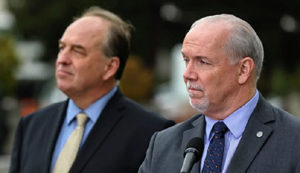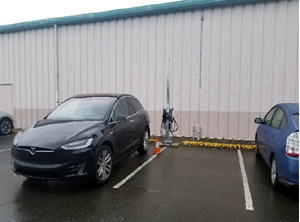Tuesday, November 20, 2018 ~ BC.
In a move aimed at removing a major source of air pollution and climate change, the provincial government has put British Columbia on a path to require the sale of all new light-duty cars and trucks to be zero-emission vehicles (ZEVs) by the year 2040.
Premier John Horgan today announced that his NDP government, in partnership with the BC Green caucus, will introduce legislation next spring to phase in targets for the sale of zero-emission vehicles (ZEVs).
The legislation will set targets of 10% ZEV sales by 2025, 30% by 2030, and 100% by 2040, while government will take additional steps to make ZEVs more affordable.

The Premier outlined a three-point plan to kick-start and fuel the rollout of the ZEV standard:
1. Expanding the size of the province’s electric vehicle direct-current fast-charger (DCFC) network to 151 sites, with 71 already completed or underway and, leveraging federal and private-sector dollars, another 80 in the works.
2. Increasing the provincial incentive program, administered by the New Car Dealers Association of BC, by $20 million this year to encourage more British Columbians to buy clean energy cars now. This will bring the incentive program up to $57 million in total.
3. Reviewing the incentive program with an eye to expanding it over time, so buying a ZEV becomes a more affordable option for middle- and lower-income British Columbians.
“If we want British Columbians to be part of the solution for reducing air pollution, we need to make clean energy vehicles more affordable, available and convenient,” said Premier Horgan, who added that this initiative is the first major policy commitment of the government’s upcoming strategy to meet BC’s legislated climate goals.
“Everywhere I go, I hear from British Columbians who are excited to embrace electric vehicles,” said Andrew Weaver, leader of the B.C. Green caucus. “As an EV owner myself, I can attest to how good it feels to save fuel and repair costs, while doing my part to reduce emissions. The B.C. ZEV mandate is an exciting development that will support British Columbians as we make the shift to the low-carbon economy.”
British Columbia already has one of the largest charging and fuelling infrastructure networks – electric and hydrogen fuelling – in Canada and, with 12,000 clean energy vehicles registered, the highest adoption rates of electric vehicles in the country.
Michelle Mungall, Minister of Energy, Mines, and Petroleum Resources said in a release: “We are committed to making cleaner vehicles more affordable and expanding the vehicle and charging network across the province. We’re working toward a seamless network, integrated with other jurisdictions and servicing both urban and rural areas.”
George Heyman, Minister of Environment and Climate Change Strategy said in a release: “Creating affordable and accessible choices for people go hand in hand with lowering emissions. This is a great step that will help us cut carbon pollution with cleaner, healthier transportation. By embracing the ZEV standard, we’re joining other jurisdictions like Quebec, 14 U.S. states and many others worldwide.”
More:
B.C.’s Clean Energy Vehicle Program
CEVforBC vehicle point-of-sale incentive program
Government Backgrounder:
Program support for zero-emission vehicle use and infrastructure:
British Columbia is a leader in zero-emission vehicles, with one of the largest charging-infrastructure networks in Canada (over 1,500 public charging stations) and the highest per capita adoption rate of electric vehicles in the country with about 12,000 CEVs registered in B.C.
The B.C. government has committed more than $71 million to the Clean Energy Vehicle (CEV) Program since the September 2017 Budget Update – encouraging British Columbians to choose clean, green vehicles that reduce their transportation greenhouse gas emissions. The program supports battery electric vehicles and plug-in hybrid electric vehicles, along with hydrogen fuel cell electric vehicles.
Government’s target is that by 2025, 10% of new light-duty passenger vehicle sales in B.C. will be zero-emission vehicles (ZEVs), increasing to 30% by 2030 and 100% by 2040.
B.C.’s CEV Program invests in five main program areas:
* vehicle incentives;
* electric charging and hydrogen refuelling infrastructure, incentives and support;
* fleet support;
* public education and awareness; and
* research, training and economic development programs.
To make cleaner vehicles more affordable and reduce greenhouse gas emissions, the Province offers point-of-sale incentives through CEVforBC (administered by the New Car Dealers Association of BC) of:
* up to $5,000 for the purchase or lease of a new battery electric or plug-in hybrid electric vehicle; and
* up to $6,000 for a hydrogen fuel cell vehicle.
The BC government’s current support for zero-emission vehicles has:
* more than doubled the size of BC’s electric vehicle direct-current fast-charger (DCFC) network to 71 from 30 sites with:
* BC Hydro installations at 20 new sites, which leverage about $1 million in federal funding and $700,000 in provincial CEV Program funding;
* thirteen DCFC sites throughout the Kootenays, with FortisBC operating five (with $125,000 from the CEV Program) and BC Hydro operating eight; and
* DCFCs at eight highway rest areas throughout the province.
* delivered $2 million in provincial funding for the next deployment of 80 DCFCs leveraged with two-to-one federal-to-provincial dollars. Through an agreement with the federal government, the B.C. investment is included in the latest federal call for projects and will be included in future federal calls until the $2 million is fully expended and the target of 80 additional DCFCs is achieved in BC;
* provided $1 million from the provincial Innovative Clean Energy (ICE) Fund to help local government and private fleets adopt hydrogen fuel cell electric vehicles; and
* put in place the first six public retail hydrogen fuelling stations in BC, starting this year with two stations in the Lower Mainland and one in the Capital Regional District, and completion of all stations toward the end of 2020.



